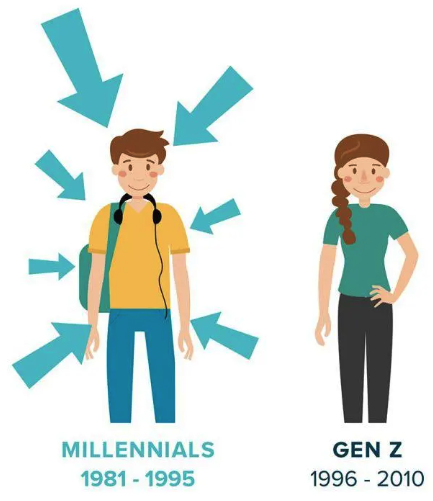The workforce is rapidly evolving, and with it, the face of leadership is changing. Millennials and Gen Z, the two youngest generations in the workforce, are poised to become the next generation of leaders. Born between the early 1980s and mid-1990s, and mid-1990s to early 2010s, respectively, Millennials and Gen Z have grown up in a digital age, shaped by technological advancements, globalization, and sociocultural shifts. Today we explore the unique characteristics and strengths of these generations and how they are redefining leadership in the modern era.

Embracing Technology
One of the defining characteristics of Millennials and Gen Z is their innate fluency with technology. These generations have been raised in a digital landscape, surrounded by smartphones, social media, and instant connectivity. As future leaders, they possess a natural understanding of technology’s potential and are adept at leveraging it to drive innovation, streamline processes, and foster collaboration. Their tech-savviness enables them to adapt quickly to emerging technologies and stay ahead of the curve in an ever-changing business environment.
Diverse and Inclusive Mindset
Millennials and Gen Z are known for their commitment to diversity and inclusion. These generations are more ethnically and racially diverse than any previous generation, and they place a strong emphasis on equality and social justice. As leaders, they prioritize building diverse teams and creating inclusive work cultures. They understand that diverse perspectives lead to better decision-making and innovation. Their inclusive mindset fosters a sense of belonging and empowers individuals to bring their authentic selves to the workplace, resulting in higher levels of engagement and productivity.
Purpose-Driven Leadership
Unlike previous generations, Millennials and Gen Z prioritize purpose over profit. They seek meaning in their work and strive for careers that align with their values. As leaders, they are more likely to prioritize social and environmental impact alongside financial success. They are not content with traditional hierarchical structures and are more inclined to lead in a collaborative, transparent, and purpose-driven manner. Their commitment to making a positive difference allows them to inspire and motivate their teams toward a shared vision, driving both personal and organizational success.
Entrepreneurial Spirit
Millennials and Gen Z exhibit strong entrepreneurial spirit. They are not afraid to take risks, challenge the status quo, and pursue their passions. These generations grew up witnessing the rise of successful startups and entrepreneurial role models, which has fueled their desire to create their own ventures. As leaders, they bring a fresh perspective, embracing innovation, agility, and adaptability. Their entrepreneurial mindset encourages experimentation and creativity, leading to breakthrough ideas and transformative change within organizations.
Continuous Learning and Adaptability
In a rapidly changing world, the ability to learn and adapt quickly is crucial. Millennials and Gen Z understand the importance of continuous learning to stay relevant and competitive. They are accustomed to constant information overload and have developed strong research and critical thinking skills. These generations are not afraid to seek new knowledge, explore different industries, and adapt to new technologies. As leaders, they encourage a culture of learning and personal growth, nurturing a workforce that is agile, resilient, and capable of navigating uncertainties.
Conclusion
Millennials and Gen Z are set to reshape the leadership landscape in the coming years. Their unique characteristics, including their technological fluency, commitment to diversity and inclusion, purpose-driven mindset, entrepreneurial spirit, and adaptability, make them well-suited to lead in the modern era. As organizations prepare for the future, it is essential to recognize and leverage the strengths of these generations, providing them with opportunities for growth, mentorship, and meaningful leadership roles. By embracing the potential of Millennials and Gen Z, businesses can thrive in an ever-evolving world.
Here is a link for books on Developing Millenials and Gen Z into leadership.


